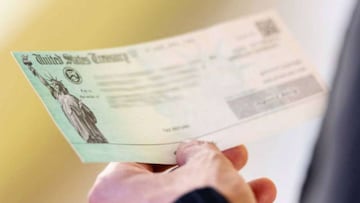How will unemployment tax break refund be sent in two phases by the IRS?
Starting in May and into summer, the IRS will begin to send tax refunds to those who benefited from the $10,200 unemployment tax break for claims in 2020.

Around 40 million people received unemployment benefits in 2020 which are taxed by the federal government and some states, which may have come as a surprise to many who had never received out of work compensation. To give those who were unfortunate to lose work during the crisis some breathing room Congress included a tax break on jobless aid received in 2020.
The American Rescue Plan passed in March included a $10,200 tax waiver per individual and up to $20,400 per married couple filing jointly for those who claimed unemployment compensation in 2020. The bill was enacted with the 2021 tax season underway and some 55 million taxpayers had already filed their taxes the week prior to 11 March according to IRS data.
Also see:
- Guidance for first-time unemployment claimants in New York
- Child Tax Credit and Stimulus Checks: how do they differ?
- What is the deadline to file taxes in May?
- Montana and South Carolina to cut unemployment payments
Millions likely qualified for tax break had already filed
In a report last week, the Treasury Department found that nearly 99 percent of the over 7 million who filed returns reporting unemployment compensation prior to the covid-19 relief bill would likely qualify for the tax break on benefits received. Individuals and couples must have an adjusted gross income of less than $150,000 to qualify for the exclusion.
To avoid confusion and delays in processing tax returns the IRS advised those who had already filed not to amend their 2020 tax return and that the tax agency would go back and automatically adjust filings for the waiver. Only in the case that the tax break changed their income making them eligible for tax credits such as the Earned Income Tax Credit should a taxpayer file an amended return.
#IRS to recalculate taxes on unemployment benefits. Money will be automatically refunded this spring and summer to people who filed their 2020 tax return before the recent changes made by the American Rescue Plan. https://t.co/pglPeUWwVu pic.twitter.com/OuNOW2H6eJ
— IRSnews (@IRSnews) May 10, 2021
The IRS will process tax returns in two phases
In an announcement the IRS informed that the agency would handle the automatic adjustments in two stages with refunds expected to begin in May. The agency said it would start with individual tax returns first, followed by those with a filing status of married filing jointly and more complicated returns. This means married couples who filed jointly will have to wait longer to get their refund if they have one coming to them than most who filed an individual tax return.
This is due to the complexity of calculating refunds for a married couple based on the tax break. The American Rescue Plan waived federal tax on up to $10,200 of unemployment compensation per person, that rule also applies for married couples filing jointly. Although the couple could receive up to $20,400 if both collected jobless aid in 2020, only half that amount could be applied to each.
The IRS gives the example of one spouse having received $5,000 of benefits and the other getting $20,000. The total amount is $25,000 but the couple would not be entitled to the full $20,400 waiver but only $15,200. The spouse that got $5,000 in compensation gets the whole amount waived, but the second spouse only gets $10,200 of the $20,000.
#IRS offers an overview of new tax law; retroactive tax benefits help many people now preparing 2020 returns. See: https://t.co/CkTJe942nD pic.twitter.com/tMZutVex7E
— IRSnews (@IRSnews) May 11, 2021
When will the IRS send tax refunds?
The agency will automatically send a refund to those who may have overpaid their taxes having claimed the full amount they received in unemployment benefits with the first refunds scheduled to begin in May. However, the agency has yet to give any further updates on the readjustment process for filers who received unemployment benefits in 2020. Nor has the IRS said when the second phase, that for married filing jointly returns, will start.
Related stories
Its likely that the IRS will need to cross-reference the 1099 tax forms for unemployment income sent by state labor bureaus to verify how much each spouse received in jobless aid according to Janet Holtzblatt, a senior fellow at the Urban-Brookings Tax Policy Center talking with CNBC. But she added that the exact method the IRS will use is unclear.
How can I check my refund?
The IRS offers a couple ways that you can check the status of your refund. You an use the agency's Where's My Refund? online tool or you can download the IRS2Go app to check your refund status.
- IRS
- Unemployment compensation
- Covid-19 economic crisis
- Science
- Unemployment
- Coronavirus Covid-19
- Economic crisis
- Taxes
- Inland Revenue
- Pandemic
- Coronavirus
- Recession
- Tributes
- Employment
- Economic climate
- Virology
- Outbreak
- Infectious diseases
- Public finances
- Microbiology
- Diseases
- Medicine
- Work
- Economy
- Finances
- Biology
- Health
- Life sciences
